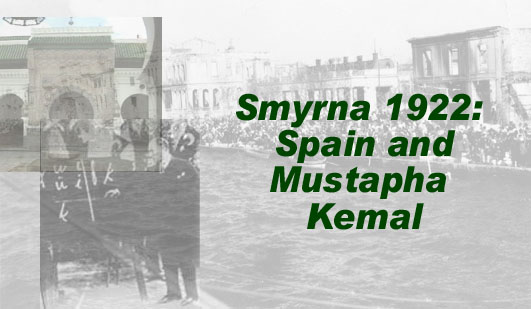|
There are two Department of State documents dated September 20 and October 3, 1922 sent by Cyrus E.Woods, the US Ambassador in Madrid, reporting on the Spanish government’s concern that Mustapha Kemal’s victory over the Greeks could inspire a Moslem uprising in Spanish Morocco. This brief article will be divided into two parts. A brief history of Morocco will be provided covering the period 1904-1922 and the Chanak crisis of September 1922 that nearly brought Britain and Kemalist Turkey to the brink of war will be discussed.
1. A brief history of Morocco 1904-1922
Morocco which is located in North Africa was an area of imperial rivalry among the major European powers before First World War. In 1904 Britain and France concluded the Entente Cordiale with each power recognizing the others interests in Egypt and Morocco. Under Article 8 of the Entente Cordiale France and Spain divided Morocco into spheres of influence. Spain received the northern part of Morocco and was committed in keeping its prize by stationing some 40,000 troops within its zone. They met fierce resistance from local tribesmen.
Germany became interested in Morocco. In March 1905, the German Kaiser, Wilhelm 11 precipitated a crisis when his ship landed at Tangiers. The Kaiser believed that the Sultan was an independent sovereign and that Germany should assert her rights in Morocco. This crisis raised the scepter of a war between France and Germany.
In order to avoid war, a conference convened at Algeciras between January-April 1906 had reached a new agreement over Morocco. The idea that Morocco being an independent state was a sham, as France and Spain retained their special privileges. French and German mining companies exploited the mineral resources of Morocco.
Another crisis occurred in 1911 when the German warship Panther was sent to protect German citizens from internal disorders in Agadir. This time the French intervened and established a protectorate in Morocco. It should be noted Britain and Germany were engaged in a fierce naval arms race.
In 1921 Abd-el-Krim leading the Riffian tribes inflicted a heavy defeat on the Spanish army at Annual. This defeat shocked the Spanish and an inquiry conducted by General Picasso found that the army was totally unprepared for combat. Abd-el-Krim established a Riffian state even with the presence of 150,000 Spanish troops.
2. Spanish concerns over Kemal’s triumph
The Spanish Government was worried that Kemal’s military victory over the Greeks might have inspired a Moslem uprising within its dominion. Moreover the Moslem world considered Kemal’s victory at Smyrna as a triumph of Islam over Christendom. (Click here to see Document.1)
The elimination of the Greek military factor in early September 1922 had left Britain in a vulnerable position. She confronted the Kemalist threat alone as France and Italy withdrew their contingents from Chanak. It should be remembered that France and Italy supported the Kemalists. After all France along with Britain were Moslem powers. Both of them had faced Arab revolts in Syria, Mesopotamia and Egypt.
From the time of the Chanak crisis till the signing of the Mudania Convention, Lord Curzon's diplomacy was directed towards ensuring that the Greek and Turkish armies did not violate the neutral zones and to achieve the retirement of the Greek forces from Eastern Thrace.
With the build up of Kemalist forces around the neutral zone at Chanak, the threat of war between Britain and Turkey was a distinct possibility. On the 23 September, the British Cabinet decided that the retention of Chanak was essential for two reasons: first, to maintain the freedom of the straits; and second to prevent war spreading to Europe.
Britain was determined to use military force, if the Kemalists entered the neutral zone. This is evident in the Cabinet's decision of 1 October instructing General Harington, the Commander-in-Chief of Allied forces in Constantinople, at Chanak to issue an ultimatum to the Kemalists to withdraw their forces by a certain time. The cool action of Harington in not issuing the Cabinet ultimatum defused a potentially dangerous situation.
The Spanish Government was grateful that Britain’s resolute stand at Chanak had prevented a European War and saved it from having to fight Moslem tribesmen within its district. (Click here to see Document .2)
Stavros T.Stavridis, Historian/Researcher, National Center for Hellenic Studies and Research, Latrobe University, Bundoora, Victoria, Australia
© 2005
|
(Posted originally October 2005; reformatted March 2007)
About the Author
Stavros Terry Stavridis was born in Cairo, Egypt in 1949 of Greek parents. He migrated to Australia with his parents in September 1952. Stavros has a Bachelor of Arts (B.A) in Political Science/Economic History and B.A (Hons) in European History from Deakin University and M.A in Greek/Australian History from RMIT University. His MA thesis is titled "The Greek-Turkish War 1919-23: an Australian Press Perspective."
Stavros has nearly 20 years of teaching experience, lecturing at University and TAFE (Technical and Further Education, the equivalent of Community College in the US) levels. He has presented papers at international conferences in Australia and USA and has also given public lectures both in Australia and on the West Coast of the US. Many of his articles have appeared in the Greek-American press. He currently works as a historical researcher at the National Center for Hellenic Studies and Research, Latrobe University, Bundoora, Victoria, Australia.
Stavros' research interests are the Asia Minor campaign and disaster, Middle Eastern history, the Assyrian and Armenian genocides, Greece in the Balkan Wars 1912-13 and the First World War and history in general.
Readers interested in the works of Stavridies may read more of his fine articles posted on HCS at the URL http://www.helleniccomserve.com/stavridisone.html.
Read More About the Greeks of Asia Minor
HCS maintains a permanent, extensive archives of articles which readers are invited to browse. For more information about Smyrna or Asia Minor Greeks, see the webpage located at the URL http://www.helleniccomserve.com/smyrnaopener.html
|


